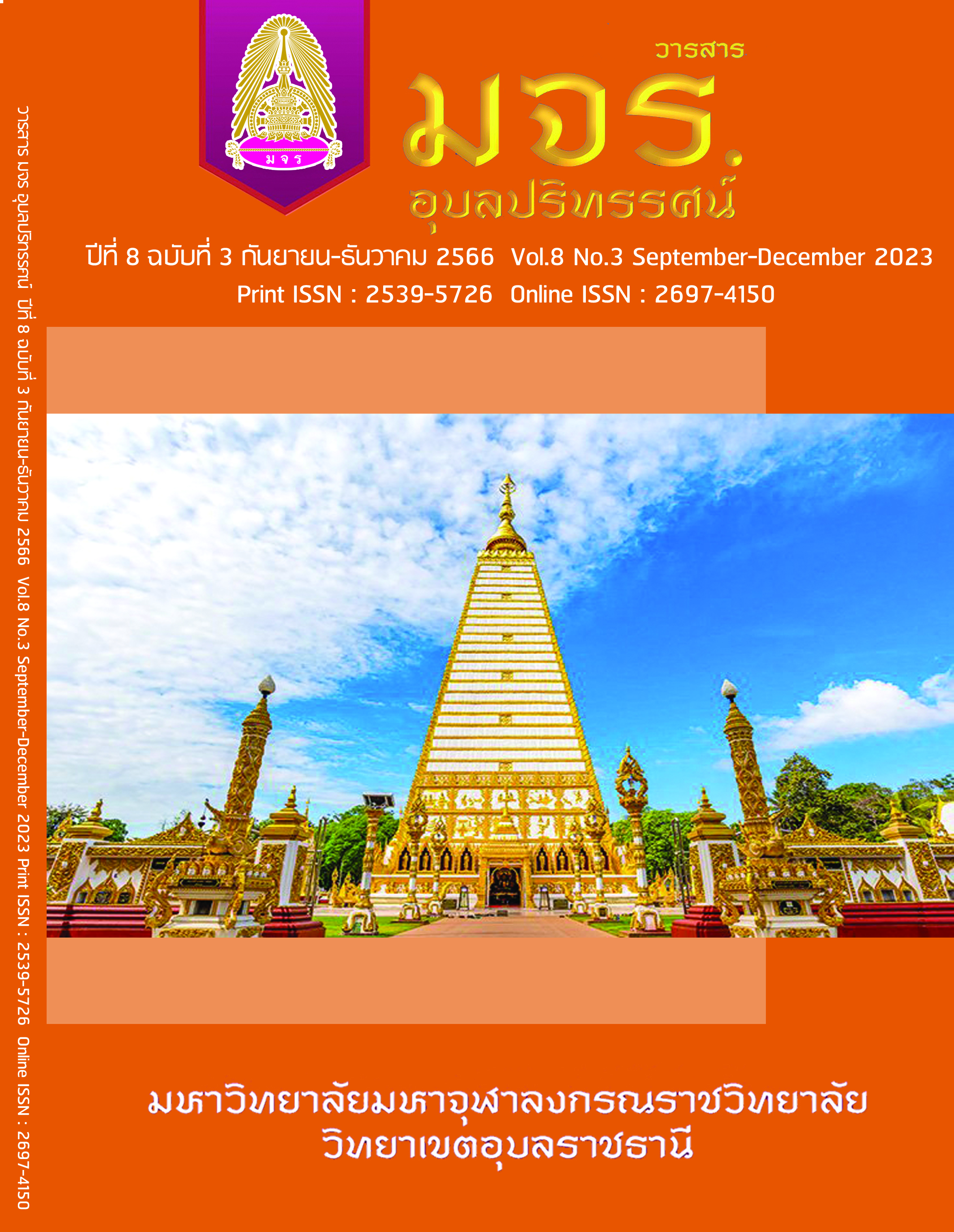THE EFFECTS OF INTEGRATING BUDDHIST PSYCHOLOGY AND NEURO-LINGUISTIC PROGRAMMING ON PROMOTING PSYCHOLOGICAL WELLBEING IN CANCER PATIENTS
Main Article Content
Abstract
The study aimed 1) to study and analyze the psychological concepts of cancer patients’ mental wellbeing; 2) to present a program integrating Buddhist Psychology and the Neuro Linguistic Program having an effect on the cancer patients’ mental wellbeing; and 3) to present the effects of a program integrating Buddhist Psychology and the Neuro Linguistic Program having an effect on the cancer patients’ mental wellbeing. This study was a quasi-experimental researh in nature, using an in-depth interview to collect data from 27 key informants selected by a purposive sampling and the sample group using the Program of G*Power secured 30 samples divided into the experimental group of 15 participants and control group of 15 participants. A content analysis, triangulation analysis and the 6Cs technique were used for analyzing qualitative data. For the analysis of quantitative data statistics including Percentage, Mean and Standard Deviation (S.D.) was used and hypotheses of the study were proved by t-test.
The results of the study were as follows:
- A study of study and analyze the psychological concepts of cancer patients’ mental wellbeing showed that the Buddhist doctrines applied by the cancer patients for enhancing their mental wellbeing in terms of relaxation, psychological stability, happiness and normal life consisted of 4 foundations of mindfulness including 1) contemplation of the body, 2) contemplation of feelings, 3) contemplation of mind, and 4) contemplation of mind-objects; and the psychological concepts of the Neuro Linguistic Program that the cancer patients applied for enhancing their mental wellbeing together with 4 foundations of mindfulness consisted of 1) self-esteem, 2) emotional control, 3) positive thinking, and 4) subconscious adjustment.
- A program integrating Buddhist Psychology and the Neuro Linguistic Program having an effect on the cancer patients’ mental wellbeing is called “PANNISA 444 MODEL” as an application model of four foundations of mindfulness comprising 1) contemplating the body by separating the feeling from the body, 2) contemplating feelings of depression, anxiety and stress, 3) contemplating mind by separating the illness from the mind, and 4) contemplating the unhealthy state of dharma dominating, oppressing and manipulating the mind to cause depression and mourning in life, integrated with 4 psychological concepts of the Neuro Linguistic Program comprising 1) self-esteem through a communication to direct the mind to build confidence in one’s own potential, 2) emotional control through a communication to direct the mind to be able to deal with negative emotions, 3) positive thinking through a communication to direct the mind think positively to overcome negative feelings, and 4) subconscious adjustment through a communication to direct the mind to think well until being able to lead a normal life, resulted in cancer patients’ four aspects of mental wellbeing including 1) relaxation, 2) psychological stability, 3) happiness, and 4) normal life.
- The effects of a program integrating Buddhist Psychology and the Neuro Linguistic Program having an effect on the cancer patients’ mental wellbeing showed that the program has helped the cancer patients’ mental wellbeing to be higher and better after participating in activities with a statistical significance of 0.5, and the cancer patients of the experimental group participated in the program “Miraculous Mental Health Promotion Program” resulted in higher mental wellbeing than the control group at a statistical significance of 0.5.
Article Details
References
มหาจุฬาลงกรณราชวิทยาลัย. พระไตรปิฎกภาษาบาลีฉบับมหาจุฬาเตปิฏก 2500. กรุงเทพมหานคร: โรงพิมพ์มหา จุฬาลงกรณราชวิทยาลัย, 2535.
Ryff, Carol D. (1989). Happiness is Everything, or Is It? Exploration on the Meaning of Psychological Well-Being. Journal of Personality and Social Psychology. 57(6): 1069-1081.
Ryff, Carol D.; & Keyes, Corey Lee M. (1995). The Structure of Psychological Well-Being Revisited. Journal of Personality and Social Psychology. 69(4): 719-727.
Thecoverage (ออนไลน์) ที่มา: https://www.thecoverage.info/news/content/6305

